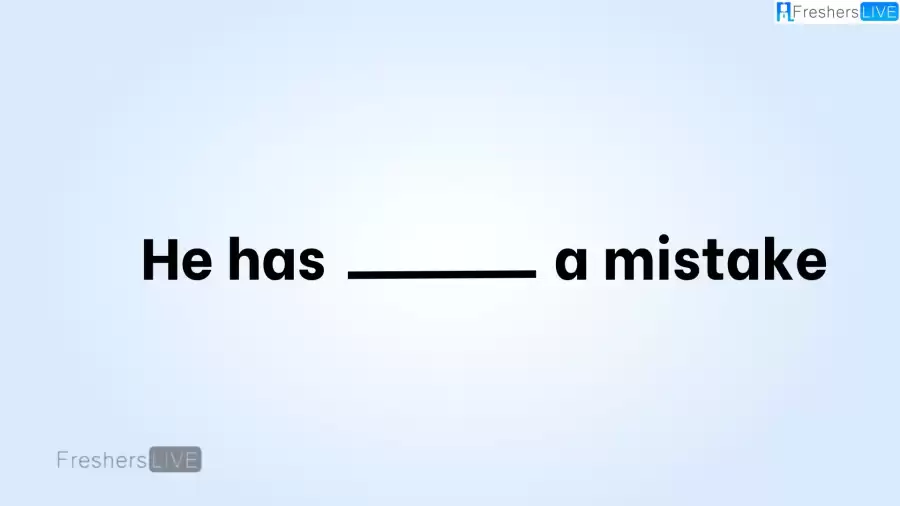Crack This English Grammar Challenge with 5 Questions in this Puzzle
by T Santhosh
Updated Oct 06, 2023

Crack This English Grammar Challenge with 5 Questions in this Puzzle
Discover the world of grammar puzzles. These puzzles give you situations where you need to use your grammar skills and creative thinking. They keep your mind active and might even help you feel less stressed. There are lots of different grammar challenges to enjoy, including the ones coming up next.
This challenge can be a bit tricky and is best for people who are really good at grammar and notice small details. When you become a pro at this type of puzzle, it's not just about having fun – it gives you skills that can be helpful in many parts of your life. Even though the puzzle might seem hard at first, your goal is to find a solution that follows the grammar rules exactly and reveals the puzzle's secrets. The next section will explain this grammar puzzle in detail and show you how to solve it.
1. He has ____ a mistake
The word "made" is used in the sentence "He has made a mistake" because it indicates that someone has taken an action or performed an activity in the past, which in this case is making a mistake. In English, the word "made" is the past participle form of the verb "make." When combined with "has" (which is the auxiliary verb "have" in present perfect tense), it forms the present perfect tense. The present perfect tense is used to describe actions or events that have a connection to the present, even though they occurred in the past.

2. She hasn't ____ her word
The word "kept" is used in the sentence "She hasn't kept her word" to indicate that someone did not fulfill a promise or commitment they made in the past. In this sentence, "kept" is the past participle form of the verb "keep." When combined with "hasn't" (which is a contraction of "has not"), it forms the present perfect tense in a negative form. The present perfect tense is used to describe actions or situations that have a connection to the present, even though they happened in the past. So, in simple terms, the sentence is saying that "She" made a promise or commitment in the past, but she did not honor or fulfill it, and this lack of fulfillment is relevant to the present moment.

3. I was ____ Italy
The word "in" is used in the sentence "I was in Italy" to indicate a location. It specifies where the subject (in this case, "I") was situated or located at a particular point in the past. In terms of grammar, "in" is a preposition. Prepositions are words that show the relationship between other words in a sentence. In this case, "in" is showing the relationship between the subject ("I") and the location ("Italy"). It tells us where "I" was.

4. Have you ever ____ a car?
The word "driven" is used in the sentence "Have you ever driven a car?" because it represents the past participle form of the verb "drive." In this context, it's used to ask whether someone has had the experience of operating or controlling a car at any point in their life.
In terms of grammar, "driven" is a past participle, and it's used in conjunction with the auxiliary verb "have." This combination, "have driven," is used to create the present perfect tense. The present perfect tense is used to describe actions or experiences that have a connection to the present, even though they occurred in the past.

5. I see you ____ arguing
The word "weren't" is used in the sentence "I see you weren't arguing" to indicate that the action of arguing did not happen in the past. In terms of grammar, "weren't" is a contraction of "were not," which is the negative past tense of the verb "to be." In this context, "weren't" is used to show that someone was not engaged in the action of arguing at some point in the past.

Solve the Equation 264 ÷ 12 + 7 x 3 - 36 ÷ 6=?
To solve this calculation, follow the order of operations. Begin with the divisions and multiplications from left to right: 264 ÷ 12 equals 22, and 36 ÷ 6 equals 6. The equation becomes 22 + 7 x 3 - 6. Now, carry out the multiplications and additions/subtractions from left to right: 7 x 3 equals 21, and 22 + 21 equals 43. Therefore, the solution is 43.
Whether you're a student, a professional, or simply someone who enjoys a good mental workout, Fresherslive is your destination. Our Brain Teaser vary in complexity, ensuring there's something for everyone.
Determine the Result of 288 ÷ 12 + 8 x 4 - 54 ÷ 6=?
For this problem, apply the order of operations. Start with the divisions and multiplications from left to right: 288 ÷ 12 equals 24, and 54 ÷ 6 equals 9. The equation becomes 24 + 8 x 4 - 9. Next, perform the multiplications and additions/subtractions from left to right: 8 x 4 equals 32, and 24 + 32 equals 56. Thus, the answer is 56.
Crack This English Grammar Challenge with 5 Questions in this Puzzle FAQs
Grammar puzzles are challenges that test your understanding of grammar rules through word or sentence manipulation.







